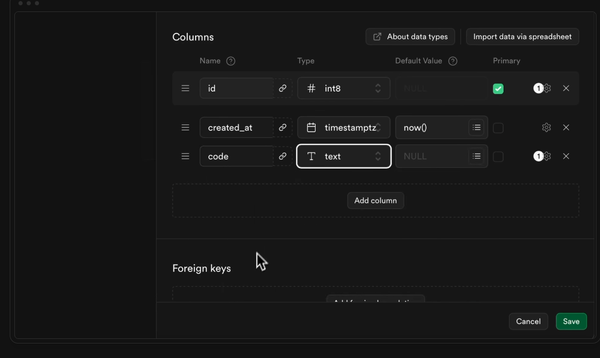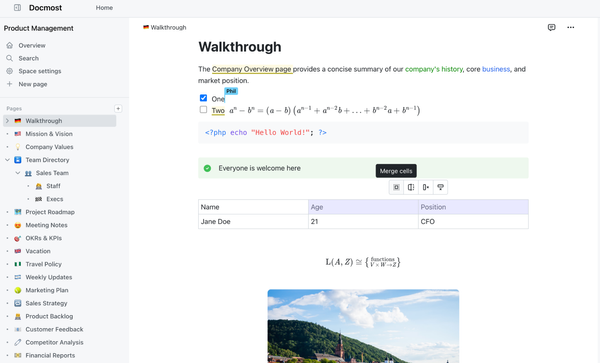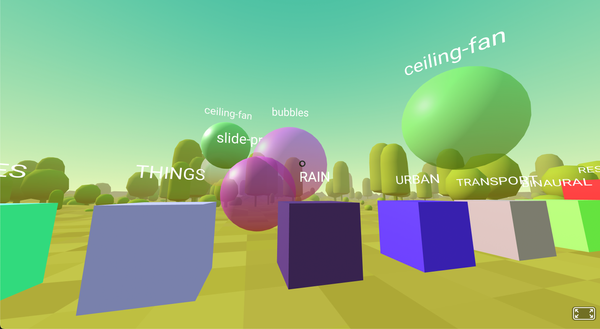17 Open-source Go Lang Blogs and CMS Solutions
Table of Content
Go language, also known as Golang, is an open-source programming language designed for building efficient, reliable, and scalable software. It was developed at Google in 2007 and is now widely used for developing web applications, network tools, and system software.
Why using Go-based CMS solutions?
These advantages make Go a popular choice for developing scalable, high-performance applications.
One of the key advantages of using Go for web-based solutions is its speed. Go is known for its fast compilation times and efficient memory usage, which allows for the creation of highly performant web applications. Specifically, the speed of Go is attributed to its compiled nature. Compiling the code ahead of time allows the Go applications to run faster compared to interpreted languages like Python or Ruby. Furthermore, the Go language's efficiency in memory usage ensures that the applications can run smoothly even when handling many requests. As a result, self-hosted web-based solutions written with Go language tend to be faster than those written with other languages.
Additionally, Go has a rich library of packages and frameworks that allow developers to easily and quickly build web-based solutions. This includes packages for handling HTTP requests, working with databases, and managing user authentication. With these packages, developers can focus on building the features that matter most to their users, rather than spending time on mundane tasks like handling low-level network protocols.
In conclusion, using Go for web-based solutions provides a powerful and efficient way to build performant applications. By leveraging its speed and rich library of packages, developers can build solutions that are not only fast but also reliable and scalable.
Benefits of Go-based CMS solutions
Some benefits of using a Go-based self-hosted CMS or blog platform include:
- Speed: As mentioned earlier, Go is known for its speed, which means that any self-hosted CMS or blog platform written in Go will be fast and efficient.
- Security: Go is designed with security in mind, making it a great choice for building secure web applications. Go's built-in garbage collector helps prevent memory leaks, and its strong typing and compile-time checking help catch potential errors before they become security vulnerabilities.
- Scalability: Go's support for concurrency and parallelism makes it easy to build highly scalable web applications. This means that a Go-based CMS or blog platform can handle numerous requests without sacrificing performance.
- Easy to Deploy: Go's compiled nature makes it easy to deploy web applications to a variety of different platforms. This means that a Go-based CMS or blog platform can be easily deployed to a variety of cloud platforms, as well as on-premise servers.
- Community: Finally, Go has a large and active community of developers, which means that there are plenty of resources available for building and maintaining Go-based web applications. This includes packages, frameworks, and online communities where developers can share knowledge and collaborate on projects.
Why using Go CMS and Blogs?
If you want to build a self-hosted CMS or blog platform that is fast, secure, and scalable, then you should consider using a Go-based solution. Go is known for its speed, which means that any self-hosted CMS or blog platform written in Go will be fast and efficient.
Additionally, Go's support for concurrency and parallelism makes it easy to build highly scalable web applications, and its built-in security features help prevent security vulnerabilities. Finally, Go's large and active community of developers means that there are plenty of resources available for building and maintaining Go-based web applications.
Types of Go-based CMS
- Full stack CMS
- Headless CMS
- Go CMS boilerplate
- Static Generators
Go-based CMS, and Static Generators solutions
1- Hugo
Hugo is a blazing fast open-source static site generator that supports templates, customizable routes, images, and instant deployment with Git-based deployment services.
2- WriteFreely
WriteFreely is a minimal publishing platform designed for writers. It can be used for blogging, sharing knowledge within an organization, or building a community around writing. WriteFreely offers tools to help writers succeed without distracting features like news feeds, notifications, or likes.

3- GoBlog
GoBlog is a powerful and dynamic blogging system that takes inspiration from Hugo. It prides itself on its high performance and unparalleled flexibility. Moreover, it boasts a plethora of IndieWeb functionalities, including but not limited to Webmentions and IndieAuth, which enable you to use your own personal blog as a unique identity on the internet.
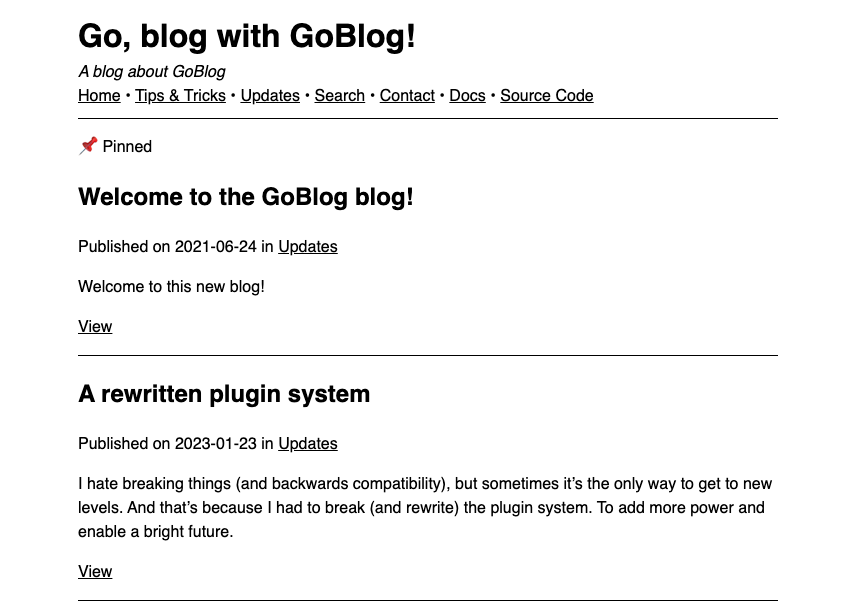
4- Journey
This is a blog engine written in Go that supports Ghost themes. It is easy to use and can be extended with plugins written in Lua. It has built-in HTTPS, no dependencies, and a small footprint.
5- Sleepy Hollow
Sleepy Hollow is a powerful and reliable headless CMS built with Go that offers a highly adaptable API model, making it the ideal tool for building robust and scalable apps.
6- GraphQL CMS
GraphQL CMS is a free and open-source headless CMS powered by GraphQL.
7- Xamboo
Xamboo is a very high quality framework for CMS, made in GO 1.17+ or higher, fully object-oriented and strong to distribute code into Web portals with heavy load and REST APIs optimization.
Xamboo is an engine to build applications that distribute any type of code to the client: It is completely independent of the generated code, i.e. you can send HTML, XHTML, XML, SGML, JavaScript, JSON, PDF, images, videos, etc.
8- Ketchup
Ketchup is a reliable, powerful, and user-friendly headless CMS that is completely free and open-source. With Ketchup, developers can easily create and customize their content templates, create APIs that meet their specific needs, enable automatic HTTPS for enhanced security, and upload and manage files with ease.
Ketchup is the perfect solution for developers looking to build scalable, high-quality apps quickly and efficiently.
9- Ponzu
Ponzu is an open-source HTTP server framework and CMS that is powerful and efficient. It offers automatic, free, and secure HTTP/2 over TLS (certificates obtained via Let's Encrypt), a useful CMS, scaffolding to generate content editors, and a fast HTTP API for building modern applications.
10- InkPaper
InkPaper is a static blog generator that was developed using Golang, making it highly efficient. The fact that it has no dependencies makes it extremely user-friendly, and it can be used on a variety of platforms.
One of its major advantages is that it is easy to use, even for those new to programming, and it builds quickly, allowing users to generate content at a fast pace. Furthermore, it is equipped with an elegant theme that will make your blog stand out from the rest, while still allowing for customization to fit your specific needs.

11- Hastie
Hastie is a static site generator, it processes a folder of Markdown text files, applies a template, and generates an HTML site.
12- Plenti
Plenti is an open source Build-Time Render Engine that helps developers create websites and web applications using Svelte templates. Plenti runs faster than other JavaScript SSGs because it is built using Go and has cut out slow processes. Its goal is to keep tooling to a minimum, so developers can spend more time building applications that are fast and efficient.

13- Static Gen
Underblog is a static blog generator that is easy to use and accessible to users of all skill levels. It has a comprehensive set of features, powerful customization options, and a robust content management system, making it the perfect solution for creating a professional and engaging blog online.
14- Zas: Static Gen
Zas is a simple static website generator in Golang.
15- Quiki (Wiki and Blogs)
Quiki is a powerful wiki suite and standalone web server that operates seamlessly with files. Rather than storing content in a database, each page is represented by a text file written in the clean and highly efficient Quiki source language.
Quiki boasts a range of features, including caching, image generation, category management, templates, Markdown integration, Git-based revision tracking, a user-friendly web-based editor, and much more.

16- cowyo
cowyo is a fast and simple self-contained wiki server that makes note-taking easy. It has an intuitive interface and many powerful features to enhance your experience.
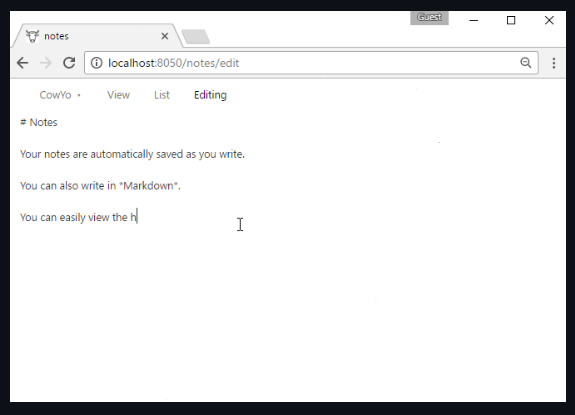
17- pRest
pRest is a free and open-source solution for building RESTful apps.

Conclusion
Go, or Golang, is an open-source programming language designed for building efficient, reliable, and scalable software. Advantages include fast compilation times, efficient memory usage, concurrency support, built-in garbage collection, strong typing, compile-time checking, and cross-platform compatibility.
Other open-source CMS/ Wiki options











